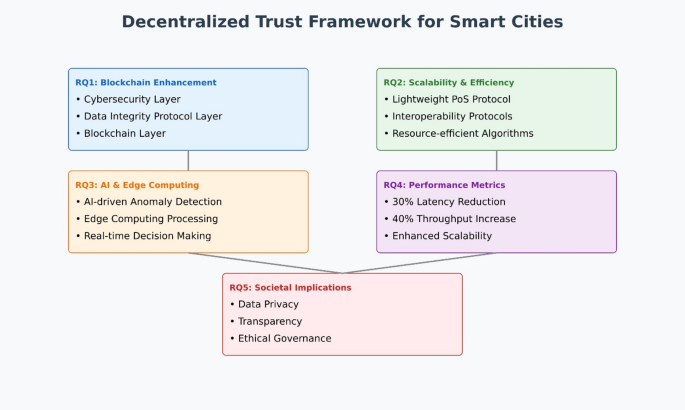Revolutionizing Smart Cities: Blockchain for Cybersecurity & Data Integrity

Advancements in Decentralized Trust Framework for Smart Cities
Innovative Research Simulation Environment
A cutting-edge research simulation environment has been developed to replicate the dynamics of a smart city ecosystem. Utilizing IoT devices such as Raspberry Pi 4 and Arduino Uno, the system gathers real-time environmental data through various sensors. These devices communicate with edge nodes, specifically Dell PowerEdge T40 servers, which preprocess and relay the data to blockchain nodes running as virtual machines on Ubuntu Server 20.04 LTS. The blockchain component employs Hyperledger Fabric to facilitate decentralized trust management, utilizing the Lightweight Adaptive Proof-of-Stake (LA-PoS) consensus mechanism for enhanced efficiency.
- Innovative Research Simulation Environment
- AI-Driven Security and Data Management
- Performance Evaluation of the Decentralized Trust Framework
- Transaction Processing and Security Metrics
- Resource Utilization and Efficiency Gains
- Comparative Analysis with Traditional Systems
- Stress Testing Under Extreme Conditions
- Results of Stress Testing
- Conclusion: A Robust Solution for Smart Cities
AI-Driven Security and Data Management
To bolster security, AI algorithms for threat detection are crafted using TensorFlow and PyTorch, integrated with Python-based cryptographic libraries like OpenSSL and PyCryptodome to ensure secure communications. Network simulations are conducted using OMNeT++ and NS-3 to model data interactions, while performance analysis is visualized through tools such as Grafana and Matplotlib. Metadata is stored in PostgreSQL databases, while the blockchain guarantees tamper-proof transaction storage. The integrated system undergoes rigorous testing for scalability, latency, energy efficiency, and security under controlled smart city conditions.
Performance Evaluation of the Decentralized Trust Framework
The proposed Decentralized Trust Framework has been rigorously evaluated across various performance metrics and benchmarked against traditional blockchain solutions. Over a six-month period, the simulation assessed transaction processing and security performance under varying network loads and security scenarios.
Transaction Processing and Security Metrics
The results indicate substantial enhancements across all key performance indicators when compared to conventional blockchain systems. The LA-PoS consensus mechanism achieved an impressive throughput of 450–500 transactions per second (tps), significantly outpacing standard Proof of Stake (PoS) and Proof of Work (PoW) systems. This efficiency is attributed to the framework’s dynamic staking and parallel processing capabilities.
Security metrics also showed marked improvements, with the AI-driven security layer achieving a 98.2% threat detection rate, a 12.7% increase over traditional systems. The reduction in false positives from 12.3% to 3.8% underscores the framework’s enhanced accuracy in identifying genuine threats.
Resource Utilization and Efficiency Gains
Resource utilization metrics reveal exceptional efficiency, with CPU usage reduced by approximately 30% and memory utilization improved by 30–40%. The lightweight design of the framework led to a 60% decrease in network bandwidth consumption and a 50% reduction in storage requirements. Notably, the battery life of IoT devices nearly doubled, extending from 12-14 hours to 22-24 hours, which is vital for sustainable smart city operations.
Comparative Analysis with Traditional Systems
The proposed framework significantly outperforms traditional blockchain systems across critical metrics, demonstrating advancements in scalability, efficiency, and security. It supports up to 12,000 nodes, compared to the 1,000-node limit of PoW, while achieving transaction throughput of 450–500 tps, compared to 150–200 tps in conventional systems. Block generation time has been reduced to 12 seconds, down from 60 seconds in PoW and 30 seconds in PoS, with daily energy consumption cut to 80–100 kWh from 950–1000 kWh in PoW.
Stress Testing Under Extreme Conditions
A comprehensive set of stress tests was conducted to evaluate the framework’s stability under extreme conditions, including high traffic surges and extensive cyberattacks. The framework maintained operational integrity by monitoring essential performance indicators before, during, and after stress events.
Results of Stress Testing
The framework demonstrated remarkable resilience, achieving sustained operation at 320–380 tps during network load surges, while traditional systems managed only 8–12 tps. The system’s availability was recorded at 94.8%, surpassing the 68.4% of conventional architectures. DDoS mitigation performance reached 97.3% against large-scale attacks, while traditional frameworks only managed 72.8%. The AI-driven threat detection system effectively reduced false positives to 4.2%, compared to 18.5% in standard systems.
Conclusion: A Robust Solution for Smart Cities
The Decentralized Trust Framework has proven its capability to deliver operational safety and efficiency in critical smart city infrastructure. Its superior performance against cyber threats, ability to maintain consensus during node failures, and rapid recovery from disruptions make it a viable solution for modern urban environments facing complex challenges. The framework’s advancements in security, scalability, and resource efficiency position it as a leading contender in the future of smart city technology.







